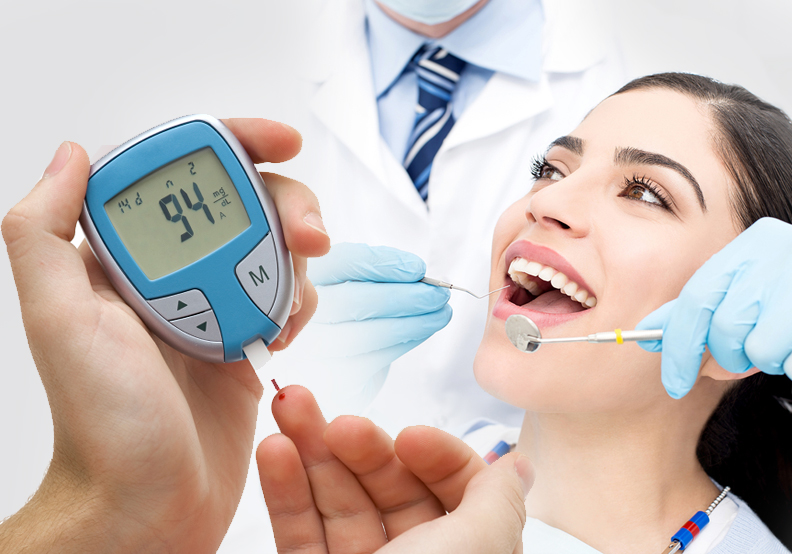An Examination of the Relationship Between Diabetes and Dental Care
Individuals with diabetes, especially those with persistently elevated blood glucose levels, face an increased risk of encountering dental problems, primarily involving gum diseases and tooth loss. Remarkably, research indicates that dentists often play a pivotal role in recognizing the signs of prediabetes or diabetes in their patients.
This article delves into the essential aspects of diabetes-related dental issues, highlighting preventive self-care routines and the importance of regular dental checkups to curb or mitigate these problems.
Foundations of Diabetes-Linked Dental Complications
Simply having diabetes isn’t the sole catalyst for dental issues; rather, it’s the extended period of high glucose levels that ignites the potential for oral problems. Just as other long-term diabetes complications are intertwined, where one issue can lead to another when blood glucose isn’t managed effectively, preventive self-care and routine dental assessments are equally vital in preventing tooth and gum ailments.
Tip: Fill out this form to check if you or a friend qualify for CGMs
Elevated blood glucose levels can lead to a decrease in saliva production and alter its composition. Saliva, the moisture responsible for preserving the oral environment, is produced by the salivary glands in and around the mouth.
It aids in chewing, swallowing, and shielding the teeth and gums against harmful bacteria.
Elevated glucose levels provide nourishment for detrimental bacteria that form a destructive layer on teeth, known as plaque.
This plaque can lead to cavities and gum inflammation when it accumulates near the gum line. Without regular brushing and dental cleanings, plaque hardens into tartar, which, when left unattended, evolves into gum disease.
Must Read CGMs in noncritical care hospitals optimizes glycemic control
Common Dental Problems Associated with Diabetes
Cavities, small openings on the tooth surface caused by decay, are the most prevalent dental problems. Promptly addressing cavities and filling them with hardening material is essential to thwart their progression.
Gum disease, often referred to as periodontal disease, emerges as the most alarming dental concern in individuals with diabetes.
According to the American Diabetes Association (ADA) Standards of Care, those with diabetes tend to experience a more pronounced and severe form of periodontal disease, usually linked to higher A1C levels.
The initial stage, gingivitis or gum inflammation, arises due to the accumulation of plaque and tartar along the gum line.
Gingivitis symptoms include redness, swelling, and easy bleeding of the gums. If left untreated, it can advance to periodontitis, an infection affecting the gums and bones, eventually causing tooth mobility.
Dry mouth can be induced by high glucose levels, certain medications, and stress. Simple self-care measures like staying hydrated, chewing sugarless gum, and maintaining proper dental hygiene can help manage dry mouth.
Thrush, or oral candidiasis, is a fungal infection that results in painful, creamy white patches on the tongue or inner cheeks. Elevated glucose levels create an ideal environment for this fungus to thrive.
Burning mouth syndrome, characterized by a scalding or tingling sensation in the mouth, sometimes accompanied by numbness, dryness, or altered taste perception, can be challenging to diagnose.
Also, read about Metformin and Latic Acidosis
Recognizing Dental Problem Signs and Symptoms
Being vigilant about the signs and symptoms of dental and gum issues is crucial for individuals with diabetes. The following are indicative signs that should prompt attention:
- Swollen, bleeding, or reddened gums
- Receding gums
- Loose teeth
- Widening gaps between teeth
- Persistent dry mouth, possibly signaling elevated glucose levels
- Unresolved bad breath despite regular brushing
Early detection of oral health problems holds significant value. Lizzette Kopco, a diabetes community advocate, biologist, and podcaster diagnosed with early-stage periodontal disease during a routine dental cleaning, emphasizes the importance of recognizing the link between diabetes and dental health. Her own experience highlights the significance of proactive self-care efforts.
Read Guide about Wegovy Dosage Guide: The Best Way For Weight Loss
Preventing Diabetes-Related Dental Issues
Preventing dental problems related to diabetes entails daily and annual actions to maintain oral health. Daily routines include:
- Managing blood glucose levels within the desired range, in collaboration with healthcare providers.
- Brushing teeth at least twice daily with fluoride toothpaste, or ideally after every meal, using a soft-bristle toothbrush.
- Flossing daily, or after each meal.
- Regularly monitoring the gums for any signs of dental problems.
- Limiting the consumption of sugary foods and beverages, followed by brushing and flossing if indulging in such items.
- Quitting smoking or tobacco use to mitigate the risk of gum disease.
Annual or as-needed actions include:
- Annual dental checkups, cleanings, X-rays, and comprehensive examinations, especially for those diagnosed with diabetes.
- Scheduling follow-up appointments at the end of each dental visit.
- Attending to any issues or recommendations arising from dental checkups, which may involve referrals to specialists.
Furthermore, educating oneself about common dental problems associated with diabetes and their telltale signs is crucial.
Sharing relevant information with dental professionals and discussing individual glucose levels and diabetes management is vital in the prevention and early detection of dental issues.
Affordable Dental Care Options
For those without dental insurance or facing financial constraints, various low-cost or free dental care options are available through state Medicaid programs, Children’s Health Insurance Programs (CHIP), community health centers, and dental hygiene training programs. While traditional Medicare may not cover most dental services, some Medicare Advantage plans may offer dental care coverage.
In light of the challenges presented by COVID-19 restrictions and limited access to affordable dental care, Lizzette Kopco’s journey through stage 2 periodontal disease necessitated deep cleaning and antibiotics.
To slow the disease’s progression, she now adheres to a regimen of daily prescription-strength fluoride toothpaste and regular dental cleanings every three months, accompanied by prompt follow-ups.
Her experience underscores the significance of understanding the interplay between elevated glucose levels and diabetes complications, following recommended daily self-care practices and maintaining regular dental checkups. In Kopco’s words, “Know that your daily self-care efforts matter.”


